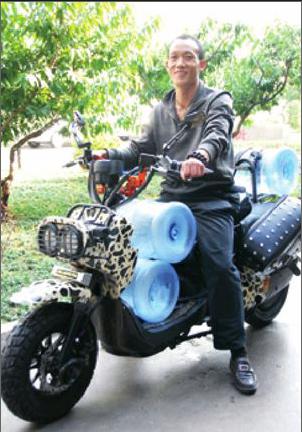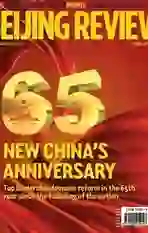With a Little Luck
2014-10-23ByDingYing
By+Ding+Ying

During one week in mid-August, Shu Qianmis customers were inquiring as to his whereabouts every day, “Has he come back? When will he come back?” His absence during a trip to his hometown showed just how much his delivery services were needed.
Shu is not what most would consider an influential person. He is one of Beijings ubiquitous migrant workers, those who come to big cities from rural areas to make a living, usually through hard labor. But he is not just any ordinary worker—Shu has actually realized his dream of becoming an integral part of this big city.
Seeking better opportunities
Shu is slim and tan, his short hair always pointing toward the sky. When asked how old he is, Shu generally lets the questioner take a guess. Most of his customers believe he is about 30 years old. Then he bursts into a big laugh, saying, “My first daughter is a graduate student now. I am 42.”
He attributes his younger appearance to his physically demanding line of business: delivering 20-kg barrels of mineral water. Shu runs this small business, of which he is both the owner and the only employee, in Beijings central Xicheng District, covering a delivery area of a considerable size. Its about 8 km from north to south and 7 km from east to west.
People like Shu are an important mainstay of Beijing. According to the Municipal Bureau of Statistics, Beijings permanent resident popula- tion stood at 21.15 million in 2013, including more than 8 million migrants who had been in the city for more than half a year.
Born in 1972 in a village near Chengdu, capital city of southwest Chinas Sichuan Province, Shu never had the opportunity to go to college. In 1997, he came to Beijing with friends from his hometown to look for work, ending up with a job in the interior decoration business. “There is only one reason we relocated here: We could make a lot more money in Beijing than in our hometown,” Shu said.
After two years in the decoration business, he was hired to deliver a famous brand of barreled mineral water to residences and businesses around the area, and saved up as much money as he could. This allowed him to eventually open his own small business delivering water, working as his own boss.
Because Shu is both strong and reliable, most of his customers have relied on him for over 10 years. When he gets a call for a delivery, whether in the early morning or late at night, he can have the barrels of water at that location within 20 minutes, even helping to position them on top of water dispensers. Since there are many old buildings within his delivery radius that have no elevators, he must often carry at least one barrel over his shoulder and use the staircase.

“I am always busy, because there are many people who need safe, drinkable water,” said Shu. “But I am my own boss. When I work harder, I earn more money for myself.”
Shu has two vehicles for transporting the bottles across the community: an electric motorcycle, which is used to deliver the smaller family orders that usually consist of three barrels or less, and an electric tricycle for moving the bigger loads. Shu sells and delivers an average of 20,000 barrels of water every year, which involves the transfer of about 50 barrels every day. His gross profit for each barrel is about 8 yuan($1.3). According to him, this works out to a monthly income of about 10,000 yuan ($1,600). His delivery station is housed in a single-story apartment along a bustling Xicheng street, for which he pays about 3,000 yuan ($485) in rent per month. That cost aside, Shu is satisfied with his income—he still makes far more than most other migrant workers.
According to a report released by Chinas National Bureau of Statistics earlier this year, the total population of migrant workers across the country reached 269 million in 2013, 166 million of whom were working in large cities. The average monthly income of migrant workers employed in theses cities is about 2,600 yuan(about $420).
A dream fulfilled
Unlike many other migrant workers, Shus wife and younger daughter are with him in Beijing, living a life similar to native-born city dwellers.
When he and his wife first came to Beijing, his first daughter had no choice but to stay in Shus hometown and receive his education there, a common problem for migrant workers due to Chinas hukou (household registration) system. The girls grandmother had been taking care of her for over a decade.
“My first daughter is very intelligent and thoughtful. We planned to go back to Chengdu when she was preparing for the college entrance examination. But she convinced us there was no need to do that because she would try her best to get a good score,” Shu said, smiling with pride. “And she did it. Now, she is a graduate at a university in Chongqing learning to be a certified public accountant.”
Shus wife works as a part-time employee with a housekeeping service, helping clean houses and cook for families. Making the average salary in this line of work, she can bring home at least 4,000 yuan ($645) every month.“Beijing is an open and inclusive city. Most people are kind and friendly to transplants, and I scarcely feel excluded,” Shu said.
Adding to his contentment is that his second child has been able to receive his education here in the city. In 2008, Shus younger son entered the renowned China-Cuba Friendship Primary School at no cost. This was an extraordinary stroke of good luck for the family.
“My kid is a lucky girl,” said Shu. “In 2008, she got into the primary school easily, because the Beijing Municipal Government issued a special beneficiary policy to migrant families whose hometowns were affected by the devastating Wenchuan earthquake, which included Chengdu.”
These days, Shus second daughter is studying at No. 35 Middle School, made famous for its outstanding quality of education. Its close to Shus water delivery business.
As such, Shu and his family live a happy life here. His elder daughter plans to find a job in Beijing after graduation so that the family can finally be together. Owing to the citys skyhigh real estate prices, though, Shu still hasnt bought an apartment here. He said that if he works for another decade and can finally afford an apartment in Beijing, he and his family will stay for good. If not, they will return to Shus hometown near Chengdu, where he has already purchased two apartments.
For now, the familys only worry is that the younger daughter will have to return to Chengdu to take her college entrance examination due to rules surrounding Chinas hukou system. Shu is holding out hope that his daughter will continue to be a “lucky girl,” as the country is on track to make further progress in reforming its education and hukou policies.
“If so, I will have nothing more to ever ask for,” Shu said.
